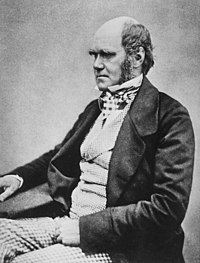User blogs

1. Charles Darwin ended his most fundamental scientific work The Origin of Species (1872, 6th edition) with the words:
“There is grandeur in this view of life, with its several powers, having been originally breathed by the Creator into a few forms or into one; and that, whilst this planet has gone cycling on according to the fixed law of gravity, from so simple a beginning endless forms most beautiful and most wonderful have been, and are being evolved.” (Darwin 1928, 463).
2. “Another source of conviction in the existence of God, connected with the reason and not with the feelings, impresses me as having much more weight. This follows from the extreme difficulty or rather impossibility of conceiving this immense and wonderful universe, including man with his capacity of looking far backwards and far into futurity, as the result of blind chance or necessity. When thus reflecting, I feel compelled to look to a First Cause having an intelligent mind in some degree analogous to that of man; and I deserve to be called a Theist.” (Darwin 1995, 60).
3. “To my mind it accords better with what we know of the laws impressed on matter by the Creator, that the production and extinction of the past and present inhabitants of the world should have been due to secondary causes, like those determining the birth and death of the individual.” (Darwin 1928, 462; The Origin of Species).
4. “With respect to the theological view of the question; this is always painful to me. I am bewildered. I had no intention to write atheistically.
I cannot anyhow be contented to view this wonderful universe and especially the nature of man, and to conclude that everything is the result of brute force. I am inclined to look at everything as resulting from designed laws, with the details, whether good or bad, left to the working out of what we may call chance.” (Darwin 1993, 224).
5. In 1879, three years before the end of his life, Darwin wrote that he had “never been an Atheist in the sense of denying the existence of a God.” (Darwin, as cited in Bowden 1998, 273).
6. In 1873 Darwin stated: “The impossibility of conceiving that this grand and wondrous universe, with our conscious selves, arose through chance, seems to me the chief argument for the existence of God.” (Darwin, as cited in Bowden 1998, 273).
Crisis of Knowledge at the Beginning of the 21st Century (by Peter Kohut): Abstract: The contemporary crisis of thinking and knowledge is a consequence of positivism and its various branches leading to the extinction of philosophy and refusing to deal with the basic philosophical questions. Positivism became the basis for scientific knowledge replacing Hegelian dialectical rationalism, in which the classical philosophy had achieved its apex. Positivism tried to create the principles for scientific research based on the rules of formal logic and experiment, where the axiomatic approach became a starting point for finding the useful scientific results. Positivism refused to deal with the basic philosophical questions and categories regarding the nature of Being, God and the physical Universe. The way to the truth became “scientific” with many successful and useful discoveries and inventions. The dialectic logic was rejected as speculative, sophistic, metaphysical and useless and replaced by formal logic which together with mathematics and experimental verifications became the basic methods of scientific research mainly in the sphere of theoretical physics. http://scigod.com/index.php/sgj/article/view/103
Basic Cosmic Characteristics (Energy and Force) [by Peter Kohut]: Abstract: The nature of electrostatic and gravitational forces will be derived by using a dialectical logic for finding the basic relations between fundamental physical characteristics of the Universe. http://scigod.com/index.php/sgj/article/view/102
New Proofs for the Existence of God (Part III): The Teleogenical Proof (by Nadeem Haque, Mehran Banaei): Abstract: A synthesis of recent Cosmological and Biological Evidence concretely points to an Intelligence that created this universe that must be independent of this universe. The classical teleological and cosmological arguments have valid components but are not conclusive due to their segmented and non-integrated nature and also because of a logically invalid tactic/strategy used by atheists known as the fallacy of conflation. Also discussed by deconstruction, is the futile attempt at using cloaked language to hide the fact of teleological processes. Epistemologically, it is also shown why the Big Bang is a fact and not a theory. Herein, a complex yet integrated new proof that interweaves all these ideas, called the Teleogenical Proof, is presented that overcomes all the shortcomings of the latter two classical attempted proofs and connects with the Sesamatic proof on the question of infinite regress. http://scigod.com/index.php/sgj/article/view/98
Quantum Entanglement, Its Nature and Manifestations (by Peter Kohut): Abstract: Knowing the mutual interconnection of everything with everything, it is no problem to interpret the interactions between the measuring and quantum systems as any other interactions between two or more systems consisting of elementary quantum dipoles. So, all relations between the measuring apparatus and measured quantum objects are only parts of the universal cosmic network of elementary quantum interactions creating the objective physical reality, independent of a human consciousness. But the observer, as a conscious subject, plays an active and creative role in his communication with the micro-world. http://scigod.com/index.php/sgj/article/view/100
New Proofs for the Existence of God (Part II): The Cosmological Applications of the Sesamatic Proof (by Nadeem Haque, M. Muslim): Abstract: The Sesamatic Proof (aka the Relatiological Proof) for the Existence of God presented in Part I can be applied to three cosmological issues: the Big Bang; the Cyclical Universe and ever-existing matter, to prove the existence of God. http://scigod.com/index.php/sgj/article/view/97
